The First SNG-WOFI International Conference
The World Observatory on Subnational Government Finance and Investment, the first of its kind, is a joint initiative of the OECD and UCLG. It provides systematised information on decentralisation processes, territorial reforms, the powers and responsibilities of subnational governments, and the nature and weight of their income, expenditure and investment in over 120 countries – including 23 Least Developed Countries (LDCs) thanks to the decisive contribution of UNCDF. It offers an open-access database from which first-hand information on subnational government finances can be extracted and compared between countries.
The launch conference of the World Observatory on Subnational Finance and Investment took place in Paris on 17 June 2019, bringing together more than 150 participants, coming from 35 countries.
It was opened by Angel Gurría, Secretary-General, OECD who presented the main findings of the World Observatory Report 2019 and Emilia Saiz, Secretary General, UCLG. In presenting the Observatory's 2019 Report - a compendium of 122 country profiles with an analysis of key findings - Angel Gurria, OECD Secretary-General, stressed that cities are major actors in public action. The World Observatory is the largest international database on the structure and finances of sub-national governments ever produced. Beyond data and knowledge, it also aims to strengthen our collective capacity to act for improved multi-level governance. Emilia Saiz, Secretary General of UCLG, stressed that the information gathered by the World Observatory is crucial in that it provides a basis for dialogue with all relevant stakeholders. It is a major tool to inform the learning, advocacy and policy work that is at the heart of UCLG's mandate.
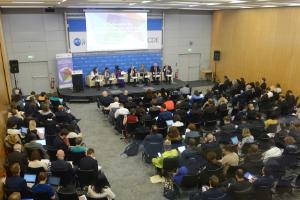 |
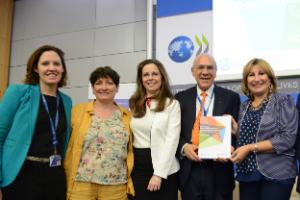 |
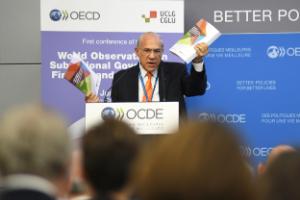 |
A high level discussion took place A high level discussion took place around the presentation of the main findings of the report, chaired by Lamia Kamal-Chaoui, Director of the OECD Centre on Entrepreneurship, SMEs, Regions and Cities. The panel discussion involved Hajia Alima Mahama, Minister of Local Government and Rural Development of Ghana, Karl-Heinz Lambertz, President of the EU Committee of the Regions, Rolf Wenzel, Governor of the Council of Europe Development Bank and Mr. Ahmed Bouazzi, municipal councillor of Tunis and Chair of the Commission of strategic thinking.
Chaired by Christel Alvergne, Regional Coordinator at UNCDF, the first roundtable "Making decentralization work to achieve global agendas", was an opportunity to recall the diversity of decentralization contexts around the world, both in terms of processes between countries but also in terms of access to resources and capacities within countries. Dorothée Allain-Dupré, Head of Unit at the OECD, introduced the roundtable and highlighted that decentralisation outcomes (click here for the presentation) – in terms of democracy, efficiency, accountability, regional and local development – depend greatly on the way decentralisation is designed and implemented. Therefore, it is the design, not the degree, of decentralisation that matters. That is why it is critical to have a systemic approach to decentralisation, in which fiscal decentralisation should not be the missing link. The objectives of the global agendas can only be achieved by fully recognizing this diversity and developing a territorial approach, Octavi de la Varga, Secretary General of Metropolis, Elisiane Mangrich, representative of the National Confederation of Brazilian Municipalities and Junghun Kim, Chairman of the OECD Network on Fiscal Relations Across Levels of Government, jointly stressed. In the same spirit, Emil Dardak, former mayor, now Vice-Governor of East Java - Indonesia, stressed the importance of designing decentralisation policies adapted to each context and matching the responsibilities and resources of local authorities to deliver on their mandate. Karine de Frémont, Head of the Urban Transition and Mobility Department at AFD, stressed the importance of the Observatory for donors to assess multi-level governance frameworks, provide guidance for fiscal decentralisation and improve dialogue across levels of government.
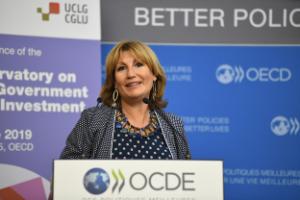 |
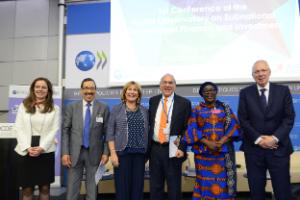 |
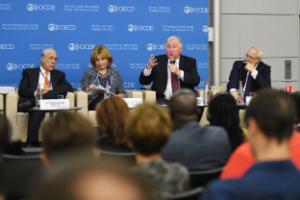 |
The second round-table, chaired by Joaquim Oliveira Martins, Deputy Director at the OECD, focused on how to "Make the most of public investment across levels of government". The panel was introduced by Paul Smoke, Professor of Public Finance at New York University (click here for the introduction video). All panellists agreed that a major challenge was to strengthen the fiscal power of local authorities. This is in particular one of the key conditions for their access to capital markets - access that is essential if the public investment capacity of local authorities is to be strengthened, said Erik Von Breska, Director General for Regional and Urban Policy of the European Commission. In this respect, Nicolas Painvain, Managing Director of Fitch Ratings, pointed out that the problem today is not so much a financial gap as a revenue/investment gap for local authorities. Increasing local government access to finance naturally requires transparency of financial systems, high-quality projects and flexibility in access arrangements to financial markets, as Chiara Bronchi, Chief Thematic Officer at the Asian Development Bank, has pointed out. It also requires all relevant actors to agree to "take risks" and invest in the long-term, for the communities, as Flo Clucas, Councillor of Cheltenham Borough Council - UK and Preben Gregersen, Director of Regional Policy - Government of Denmark, have usefully recalled. A key message shared by Christophe Kang’ombe, mayor of Kitwe and president of the Association of Local Governments of Zambia who indicated that territorial solidary in fiscal schemes was among the national guidelines for Decentralization.
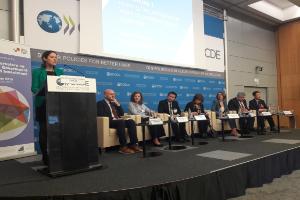 |
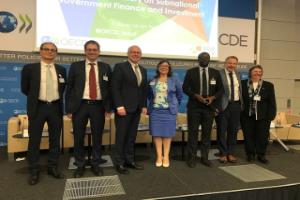 |
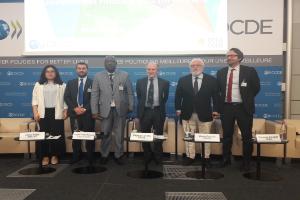 |
The third and final round table chaired by Edgardo Bilsky, Director of Research at UCLG, focused on the issue of " Data collection and management on sub national government finance ". Isabelle Chatry, Senior Policy Analyst at the OECD, indicated that the World Observatory had to face three main problems in this respect (click here for the presentation). The first was the availability of data: in many emerging economies and least developed countries, information is often non-existent, at best partial, at the national level. The Observatory must certainly set itself the objective of supporting the least developed countries in their efforts to build accurate information systems. The second problem is the lack of comparable data, resulting from a high diversity of situations, definitions and nomenclatures between countries despite the existence of international standards defined by the system of national accounts. This has sometimes led to difficulties in consolidating information and has affected the transparency, quality and reliability of data. Interpreting the data was the last major challenge and it remains difficult to assess the real degree of decentralisation. Therefore, it is always necessary to go beyond quantitative data and use qualitative information to put the figures in perspective and properly capture the trends at play. Elton Stafa in charge of the Local Finance Observatory of the Network of Associations of Local Government in South-East Europe and Thomas Rougier, Secretary General of the French Observatory on Local finance and Public Management described in concrete terms the difficulty of collecting, analysing and interpreting fiscal data at sub-national level as well as working in a multi-level governance context. Mario Pezzini, Director of the OECD Development Centre, Nan Zhang, Policy and Research Analyst at UNCDF and Vincent N'Cho Kouaoh, discussed how to overcome these challenges, the progress made and the way forward in developing and least developed countries, and stressed the need to create adequate frameworks at the national and sub-national levels (accounting, budgetary, statistical) and to strengthen skills and administrative capacity.
The closing Session on “Ways Forward” was chaired by Rudiger Ahrend, Head of Section, Economic Analysis, Statistics and Multi-level Governance, OECD. "Decentralization is not a zero-sum game in which the state loses what local and regional authorities gain; the dynamics are much more complex," said Ulrik Vestergaard, Deputy Secretary-General of the OECD, in concluding the conference. It is a win-win situation for all, national and local governments. Increasing the share of local authorities in public investment is a major challenge, particularly in the least developed countries. The Observatory provides a unique set of keys to open the debate and move forward on this. It now needs to be consolidated and sustained.
Download the agenda (English) | (Francais)
Download the presentation by Dorothée Allain-Dupré (OECD)
Download the presentation by Isabelle Chatry (OECD)
View the video of Paul Smoke's speech
See more photos of the conference
Related Documents

